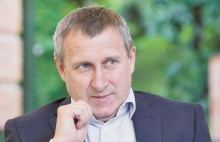Poland, which once paid a high price itself for Europe failing to deal with the Russian threat in time, is now perfectly aware of what is happening in Ukraine and how it all can end, Ambassador of Ukraine to Poland Andrii Deshchytsia told The Day. The interview was recorded in Warsaw during a Polish-Ukrainian icon painting plein air session.
Ambassador, how does the Polish government approach the Minsk talks’ results?
“Just like in Ukraine, there are different opinions on the matter here. Poland generally sees it as a step towards reconciliation. Therefore, some responses were somewhat optimistic, hopeful that the conflict would be resolved diplomatically. However, almost everyone I have spoken to, including politicians and experts, recognizes that there is a lot of work left on the way to a general peace.”
How do you personally see the talks’ results?
“I think we should seize every opportunity to discuss a peaceful settlement of the crisis situation. Also, the results that could be achieved in these negotiations were very important for us. First of them is a ceasefire, and the second is restoration of Ukrainian control over the border. These results were hard to achieve. After all, I was in Geneva when the negotiations issue was first raised, and it was clear even then that the Russian delegation did not intend to reach a peaceful settlement. Their approach was confrontational and provocation-prone. So, even getting them to sign a document is an achievement. Importantly in this case, it happened in the presence of German and French leaders, making these countries share responsibility for getting the accords to be respected.”
However, the Russian side is not respecting them. What, then, should Germany and France do next?
“As Angela Merkel said, Vladimir Putin will be held responsible for failing to respect these accords, and I think that Germany’s stance will grow firmer now, both on Putin and on getting Europe to have a clearer and more coherent stance on Russia.”
You mean just sanctions, don’t you?
“We are talking about strengthening and extending sanctions at the moment, but I think we should not rule out a scenario where Ukraine will be provided arms as well.”
You noted in a recent interview, in particular, that the negotiations on Poland providing arms to Ukraine were ongoing. At what stage is the discussion on this agreement now?
“We are conducting negotiations, and appropriate departments are holding consultations as well, including the two countries’ ministries of defense. The Polish side has not ruled out this possibility, but the final decision will be made when both sides are ready.”
Who initiated these negotiations?
“It was Ukraine, but the Polish side, too, is saying that sending arms to Ukraine remains on the table.”
As you said earlier, the conflict’s frontlines are quite close to the borders of Poland, and the Poles understand it well...
“Poland understands it better than any other nation, perhaps. There are two reasons for it. Firstly, the conflict zone is really close to Poland. Secondly, Poland has similar pages in its history, when it was divided between the Soviet Union and Germany in 1939.”
Is Poland changing its stance on Ukraine?
“I think that a clearer international response to the events in Ukraine is evolving, and it becomes increasingly evident that foreign diplomats, I do not mean just our Polish partners, now understand the situation in Ukraine better. Also, a growing number of countries understand that their governments should take a tougher stance on Russia, because it does not comply with the agreements that have been achieved over the past few months, not to mention the treaties it signed with Ukraine before. Therefore, I think that it looks like an avalanche that will grow larger, especially among European politicians, who are increasingly poised to oppose the Russian aggression.”







